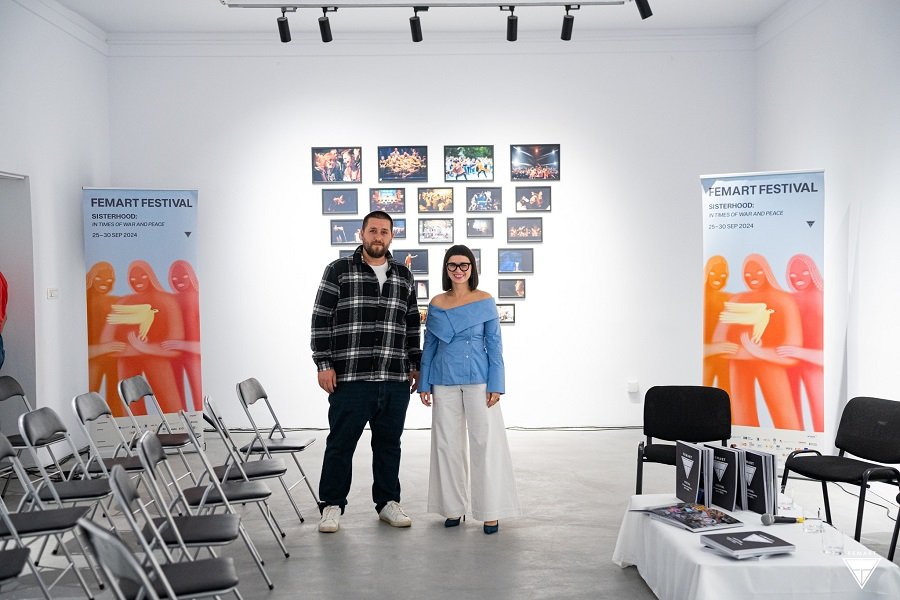By: Gili Hoxhaj
“I was really touched when I walked in today. I had to step outside and come back in to gather myself,” shared activist Igballe Rugova, reflecting on her emotions at the exhibition opening at the Faculty of Arts Gallery in Prishtina. The event also celebrated the launch of the 10 Years of FemArt monograph, edited by Ivina Bilic and assistant editor Berat Bajrami. The exhibition told the story of the festival’s decade-long journey, honoring those who started it, those who continued its work, and those who are still joining along the way.
Curated by Berat Bajrami, the exhibition focused on powerful quotes from activists featured in the monograph. Through both the monograph and exhibition, FemArt expresses deep gratitude to all those who have shaped it into what it is today. Above the table with the monographs, a special thanks was given to the photographers who have captured FemArt’s events, preserving them as moments to be remembered forever. At the heart of the exhibition was a photograph by the late Meddy Huduti, a photographer who added a unique dimension to FemArt through his work. The evening also honored his legacy with a new song, created to celebrate his creative spirit.
The monograph, nearly 200 pages long, ties together stories, interviews, articles, and personal accounts, all accompanied by images that create a simple yet captivating chronological narrative. Ivana Bilic dedicated three years to this project, which undoubtedly came with its challenges.
“The FemArt monograph didn’t start with me. This special project has deep roots and began long before, thanks to a group of women who began gathering and compiling the data for this decade-long journey. The work took about three years, and I want to sincerely thank Shqipe Malushi, Venera Ismaili, and the entire team who did an incredible job preparing the information. I haven’t been part of FemArt for the full ten years, so their work was crucial to completing this chapter,” she shared with the audience during a discussion panel led by Zana Hoxha, the director of Artpolis.
Bilic further mentioned that this has been a long and challenging journey, especially due to the distance, as she doesn’t live in Kosovo. However, she emphasized that every conversation during this process left her more inspired. “The support from Berat has been incredibly important, as he helped keep everything moving forward, even though I was far away. Many people, activists, and strong women have been part of this process. I’ve been lucky to interview them and learn from their experiences. These interviews often lasted for hours, and while I couldn’t include all of them, every conversation enriched and inspired me,” she added.
She described the process as emotional and shared some of the lessons she learned, including a conversation with Igballe Rugova that inspired this year’s FemArt motto.
“The process of creating this monograph has been emotional for me. I’ve poured a piece of my soul into this book. At times, it was frustrating, especially when I had to meet deadlines while also dealing with unexpected events in my personal life. But one of the biggest lessons I’ve learned from this project is that great things take time. In fact, everything has its own timing. We went through several versions of the book before reaching this final one, as the approaches and people who contributed to it were many and diverse. I want to share something from my conversation with Igballe Rugova. Outside the context of our interview, she mentioned that feminism is sisterhood, and this statement became the central theme of this year’s FemArt edition. It took time for this idea to be incorporated into the festival’s monograph, but it has now become an important part of it,” she continued.
During this event, Igo shared some memories from her activism during the challenging 1990s. This led perfectly into the theme “Sisterhood: In Times of War and Peace.” Igo recalled how, with the organization “Motrat Qiriazi,(Qiriazi Sisters)” they would visit villages to share their messages. She emphasized that art was the most effective way to change mindsets and communicate ideas.
“During the ’90s, when we were working, we didn’t go directly to speak to the women in the villages. It was my sister, Safete, along with the actors, who delivered the messages. At that time, there wasn’t much of a feminist movement, but art and performances were a powerful way to connect with people. When I met Zana, she told me, ‘I want to create Artpolis. What do you think?’ I said ‘YES,’ because my sister and I have always believed that we can change society through art. We’ve seen that the biggest changes happen through performances and monologues that challenge both the mind and the soul,” she shared during the discussion.
“FemArt pushes you to think differently, to be braver, and to break through the boundaries that society sets,” stated Anisa Ismaili, after seeing some of her photographs and reflecting on the support and collaboration she has had with Artpolis over the years. Berat Bajrami also joined the panel, expressing that contributions like this make him proud to be part of the feminist movement and to work with women who truly inspire. “FemArt is incredibly important for our society because barriers aren’t broken in one or two years; it takes long-term work to bring about real change,” he stated before the audience.
FemArt was described as a celebration, as it not only challenges stagnation but also honors its successes. One of these successes was the release of the monograph. What began with a sense of nostalgia ultimately ended in a moment of deep emotion, paying tribute to the late photographer Meddy Huduti. He was remembered through stories, memories, his photographs, and the premiere of a song created by Ceylan Taci titled “Mr. Photographer Mr. Prizren.” FemArt celebrated everyone—those who are still here and those who are no longer with us—who have left their mark on this history of activism through art.

